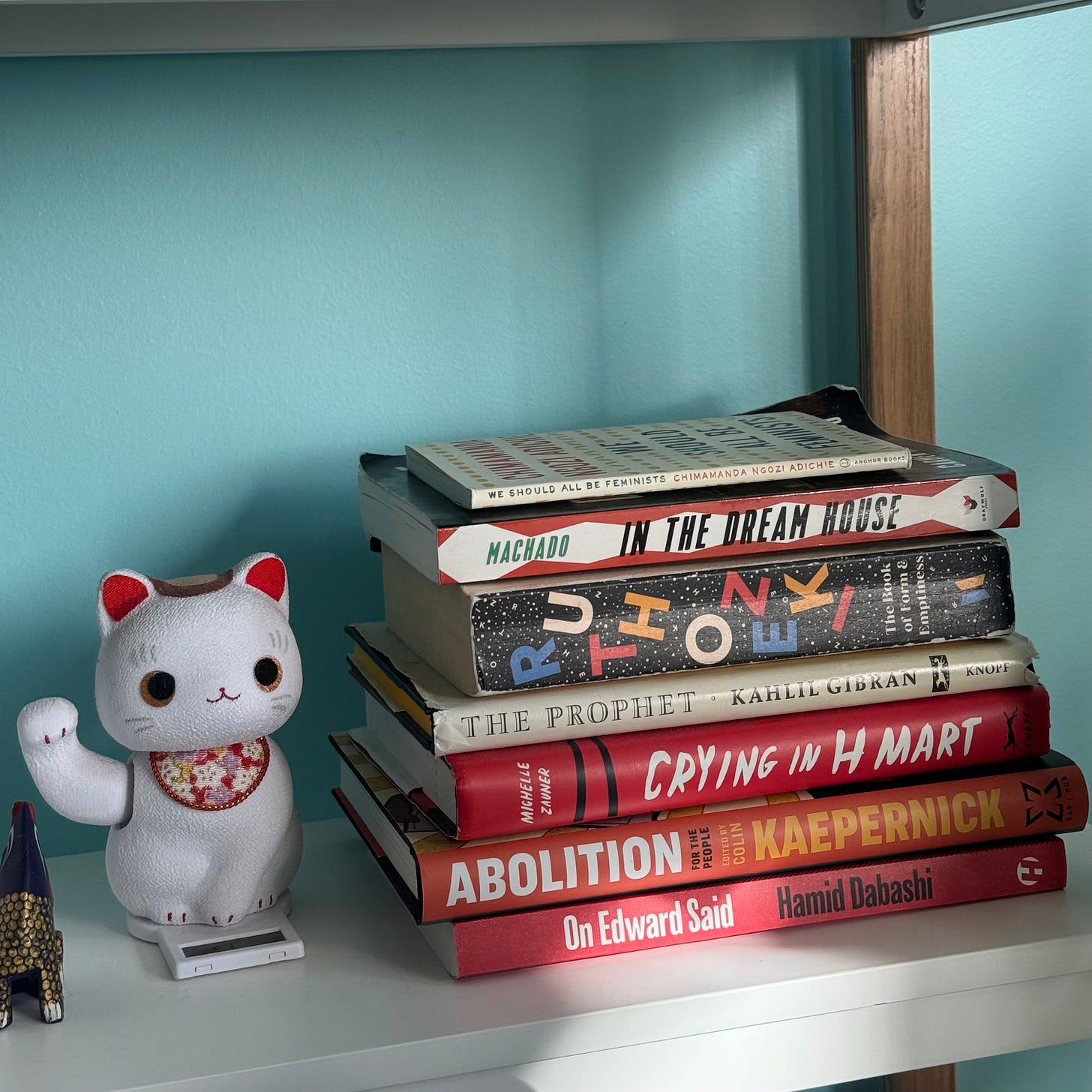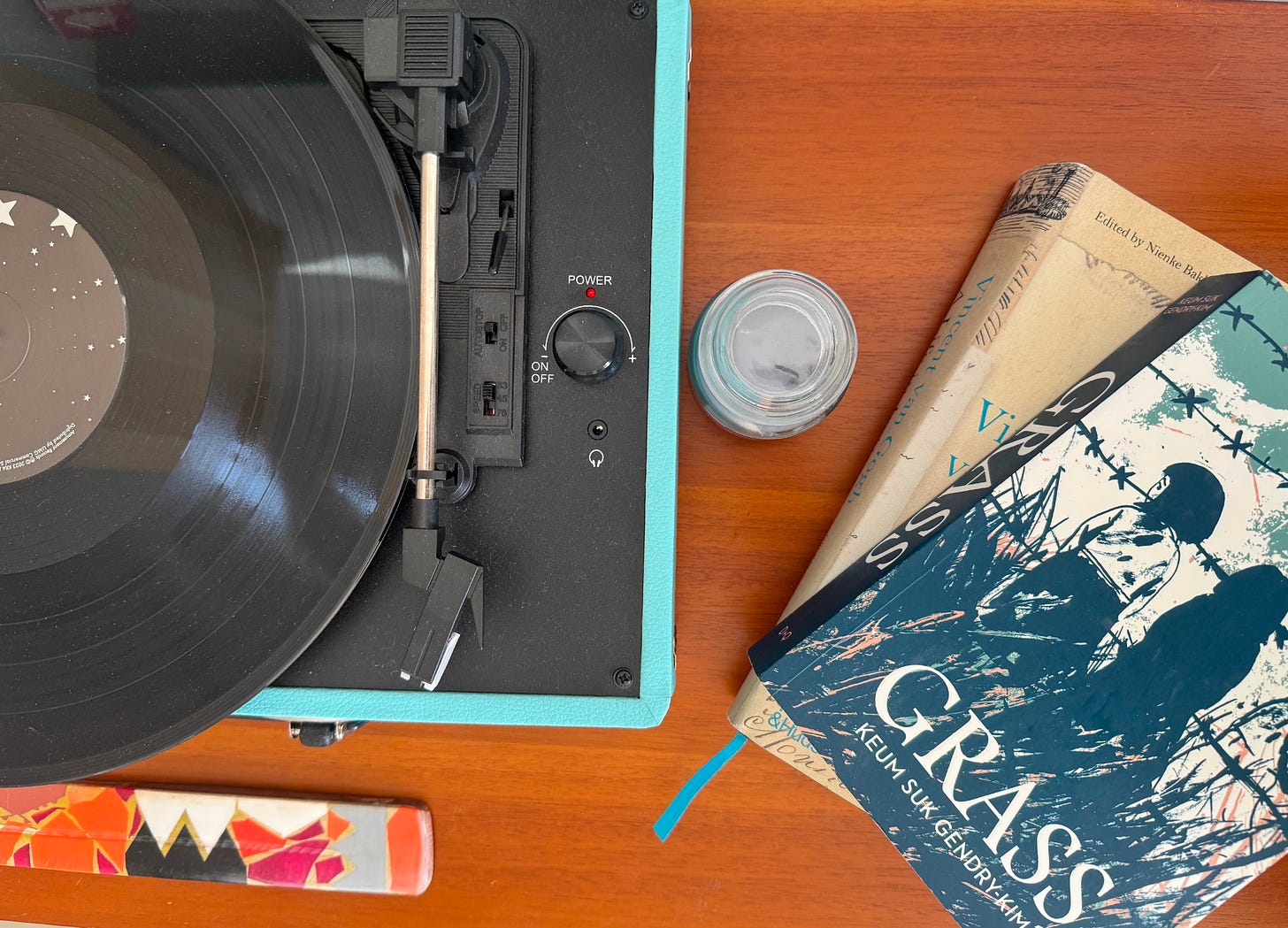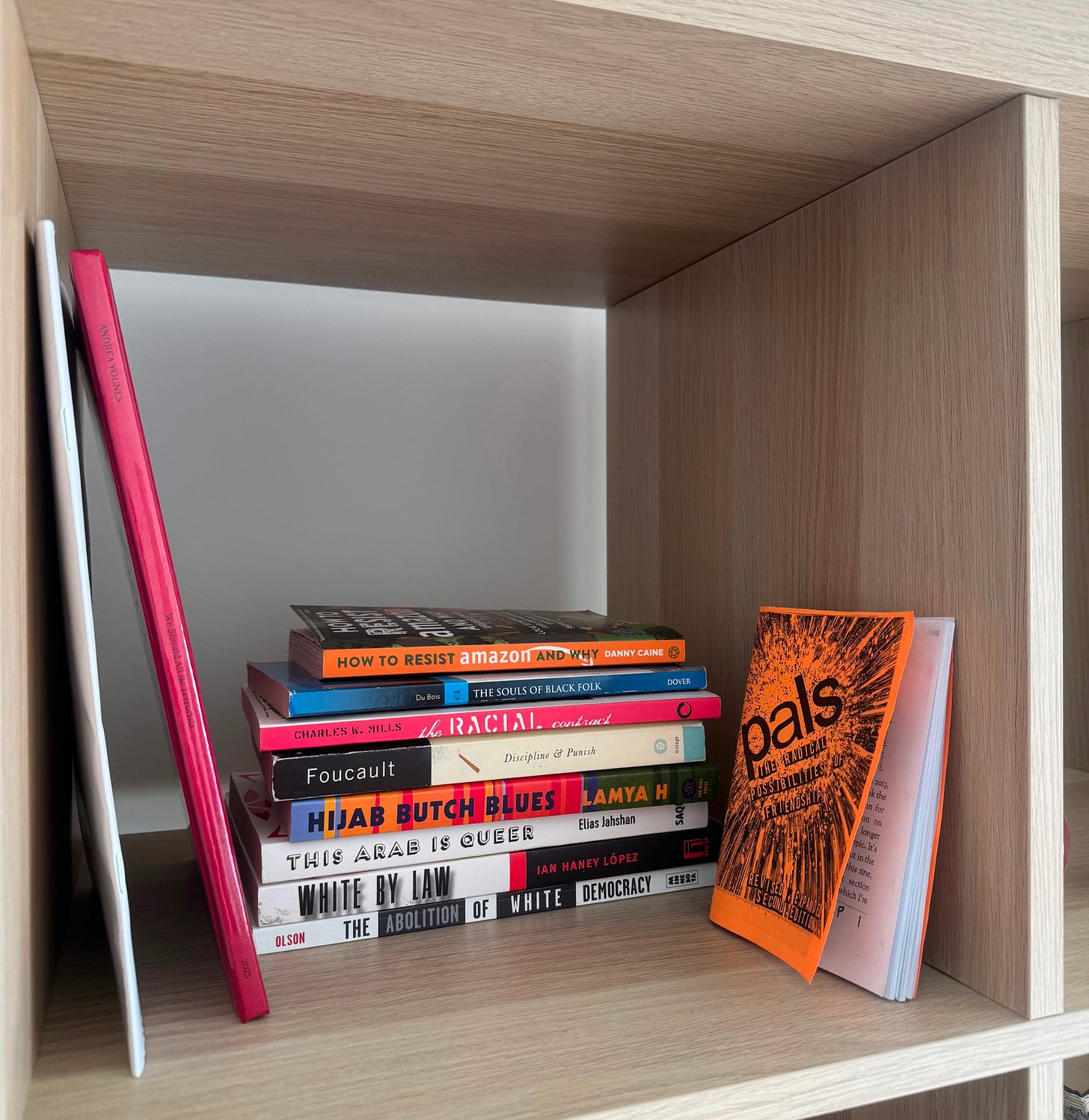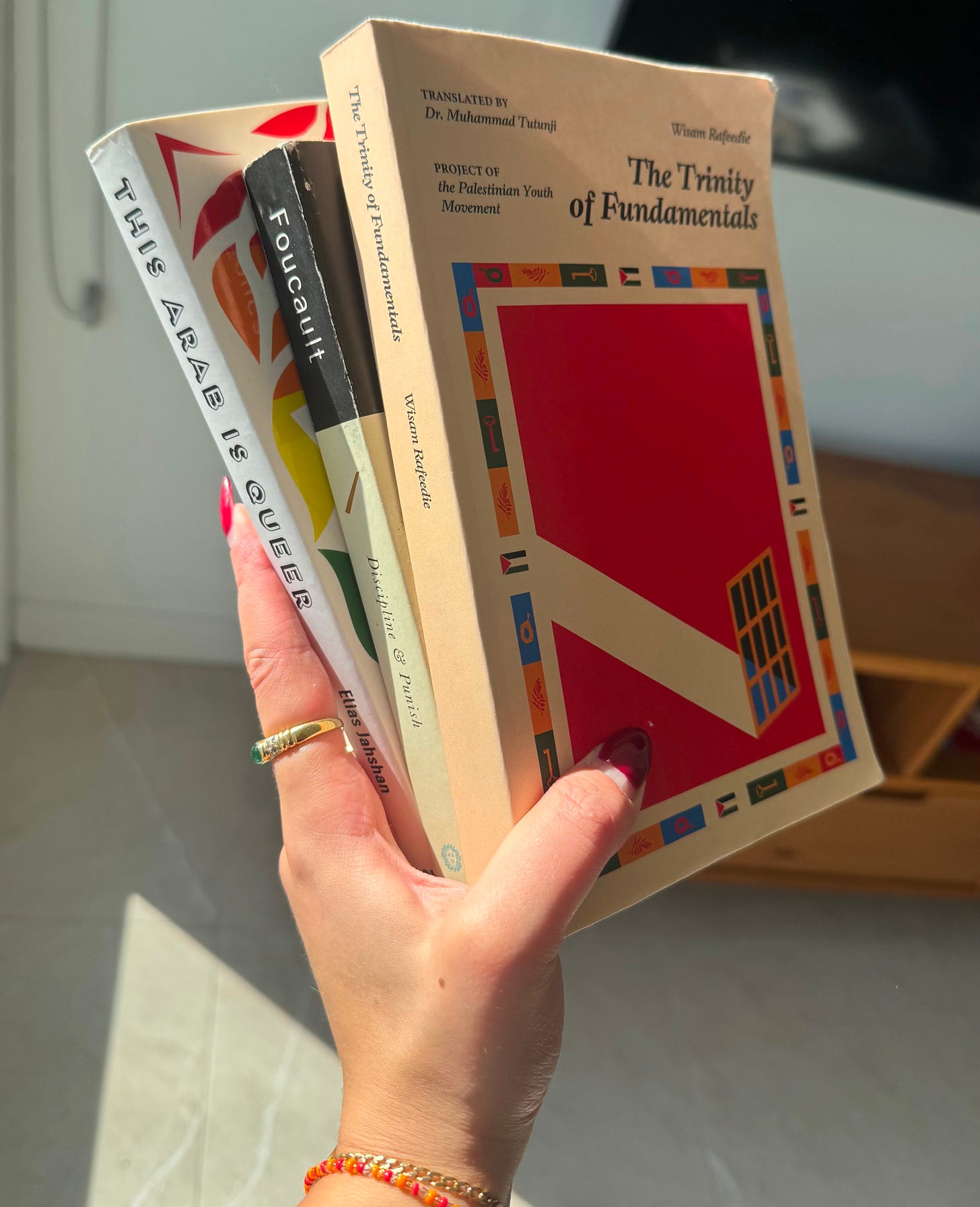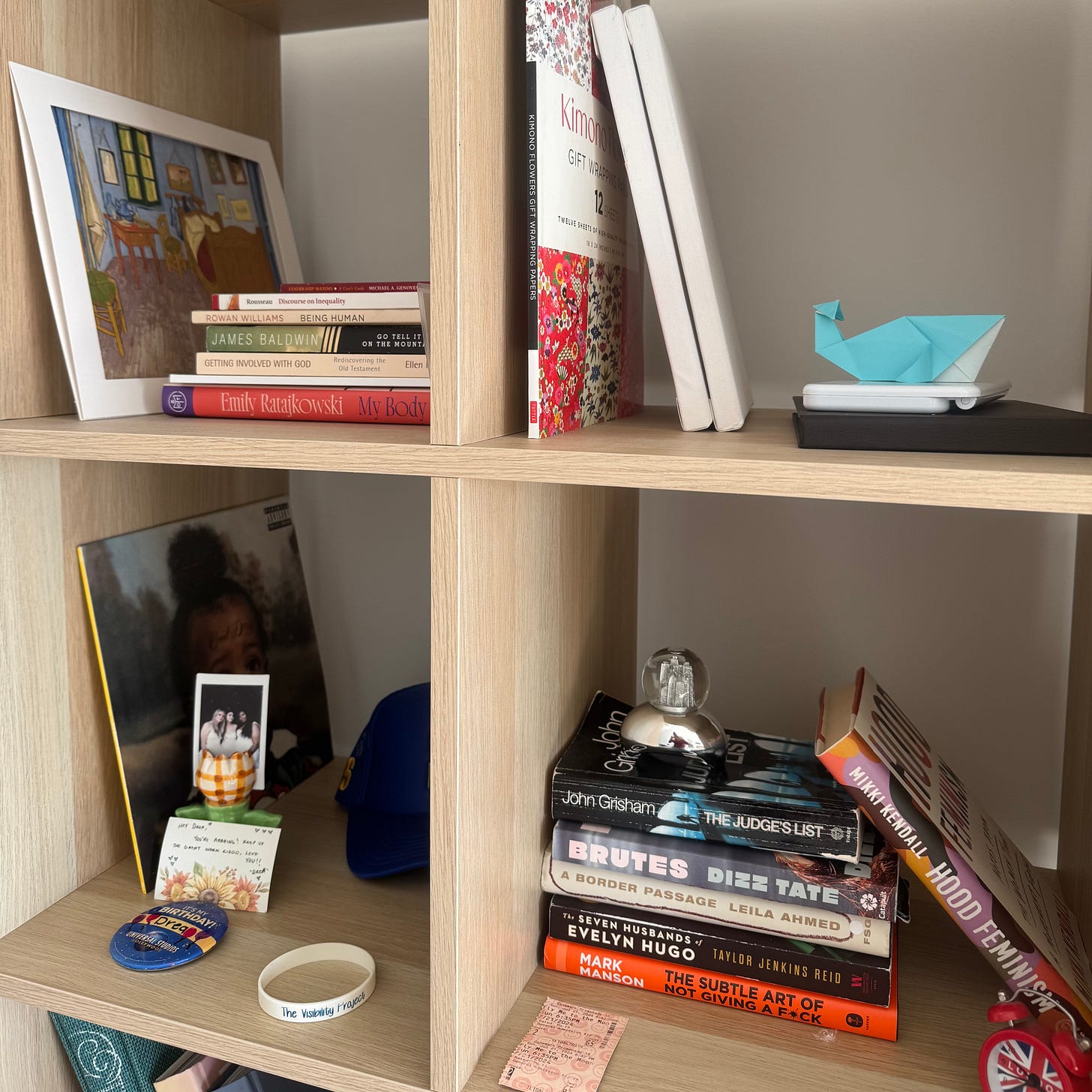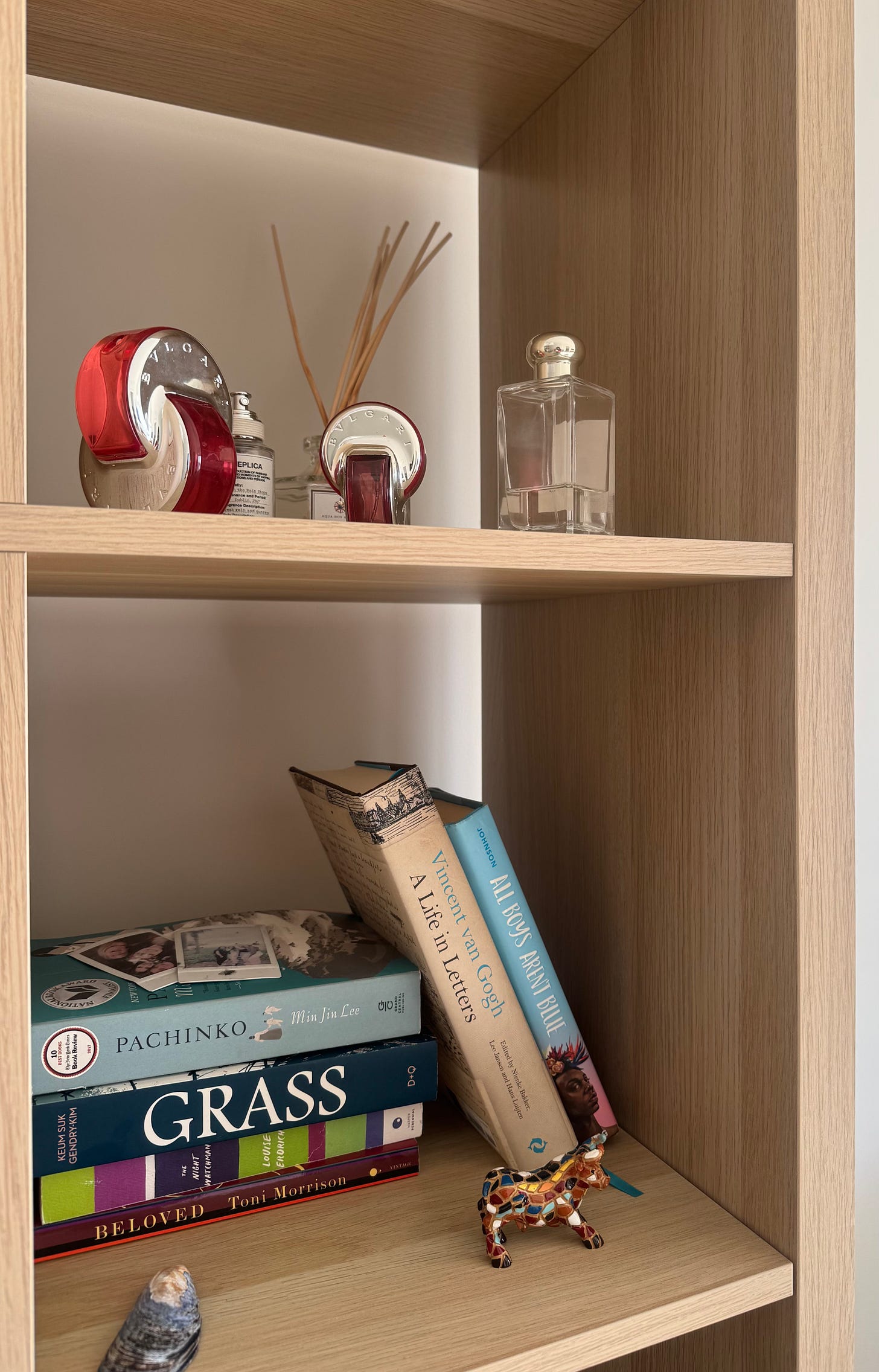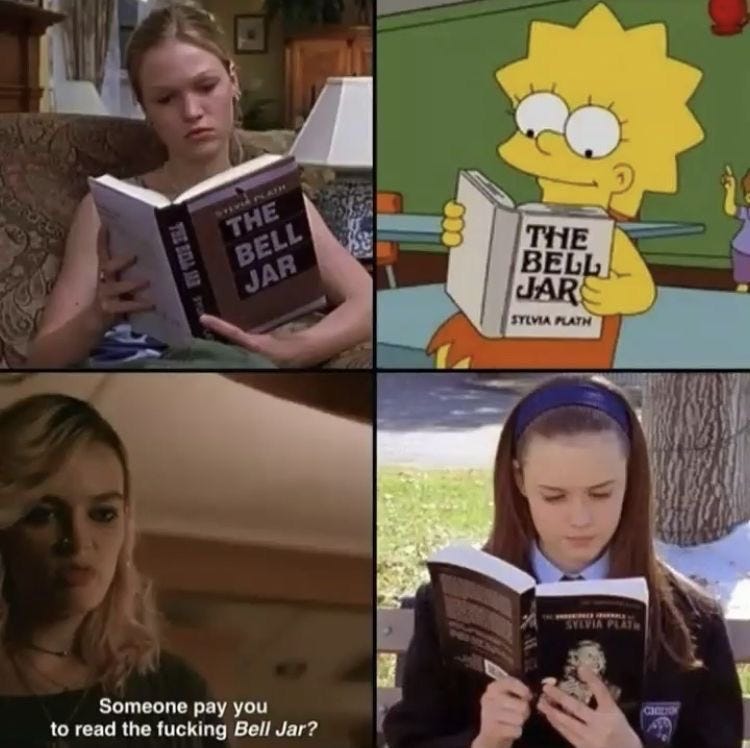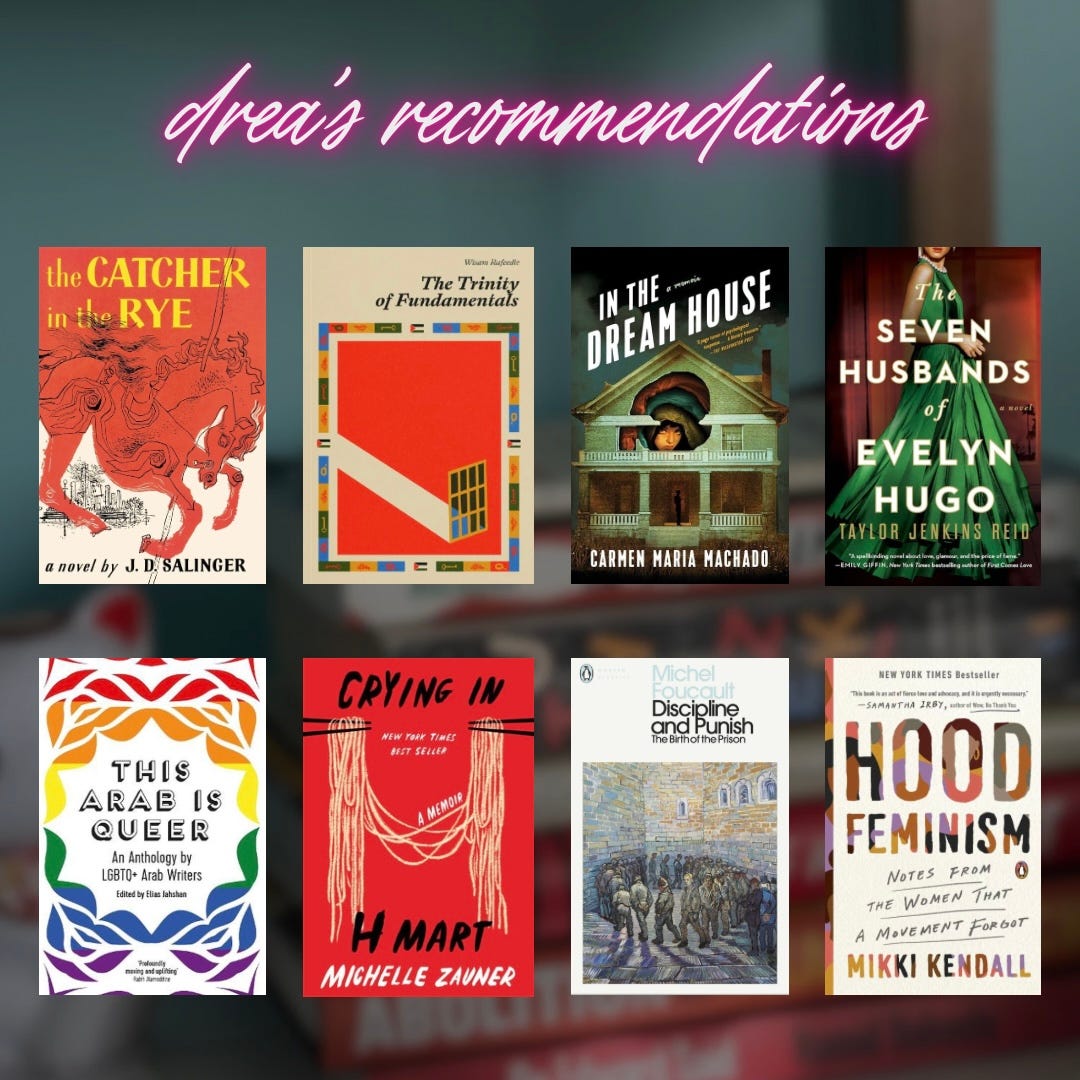The Shelf Diaries with Drea Y.
aka on writing children’s mysteries, dystopian fiction, and becoming a bookworm
Happy Monday friends!
And welcome back to The Shelf Diaries! TSD is a monthly feature for book people, about book people, with a focus on highlighting my favorite authors, writers and creatives in the arts and literary spaces; learning all about the books that have changed their lives, the authors they love and what’s sitting on their bookshelves!
To kick off our 2025 series, this month I’m joined by my best friend Drea Y. to talk all about her dreams of writing children’s books, dystopian fiction and political theory, and the book she’d turn into a blockbuster film if given the opportunity! For over two hours, we laughed, ranted, and went on a million little tangents related to online book discourse and the things we love; and it is my pleasure to share some of that conversation with you here. ♡
So… without further ado: grab a snack, get comfortable and get to know the secrets of Drea’s shelves!
note to reader: if you’re reading via email, switch to the substack app for the full interview!
Gabi: Hi bestie. *laughs*
Drea: Hi bestie. *laughs*
Gabi: *laughs* To start us off, can you introduce yourself to all of the readers at home?
Drea: Omg, ok. Just like a little background about myself?
Gabi: Yeah, whatever you wanna share, you can share.
Drea: Ok. Well… *laughs* my name’s Drea. I use she/they pronouns. I’m a child of two Arab immigrants. And I’m a grad student.
I’m currently getting my Master’s in Public Policy, but I previously did my undergrad at Loyola Marymount University, where I met the lovely Gabi. And we were so blessed to be in the same sorority and for Gabi to be my little and just my best friend ever. And yeah, that’s me.
Gabi: And how would you define your relationship to books?
Drea: I would say my relationship to books is an ever evolving one. And one that’s in recovery at the moment. I think, like a lot of people, I grew up with this love for books and reading, and then that love kind of faded away as reading became more mandatory, or mandated, through school and yeah, it just kind of faded into the background for a really long time. I wanna say [from] high school until probably, the end of my undergrad education, I didn’t really read for leisure. But after graduating from undergrad, I have been trying to make the conscious effort of making it part of my routine again, since the beginning of 2024. And I feel like I’ve been seeing it slowly come back.
Gabi: I love that for you. And do you have a distinct memory from childhood, where you fell in love with reading? Through a specific book or a class you took or anything like that?
Drea: Definitely. I have a few actually. My earliest memory of having a love for books is maybe when I was in like the fourth or fifth grade. I was utterly obsessed with the Geronimo Stilton book series. *laughs* Which was this mouse detective going on all sorts of adventures. And I just loved it. I found myself so fascinated, I guess, with the storyline and like the aspect of storytelling, so much that my goal in life at one point was to be a Geronimo Stilton author. *laughs*
Gabi: *laughs*
Drea: I don’t even know how I felt that would have been possible, but I thought maybe it was like a franchise that I could get myself into, and I could make my own Geronimo books. *laughs* And then in middle school, and early high school, I really loved the books that I had to read for class, and it fostered an appreciation for literature even though it wasn’t something that I took into my leisure time. But the books that I did read, I loved and I loved dissecting them and getting to look at them layer by layer, so that’s also a good memory that I have from my sophomore year English class, and finding a lot of my favorite books there. And being able to take those methods of analysis into how I read books now.
Gabi: I love that. What books would you say have had the most impact on you as an individual?
Drea: Ooh, that’s a really good question. I think books that tend to discuss the realities of non-Western life within a Western context always hit home the most for me. And I think of books like, Crying in H Mart. I feel like anyone with either, a non-linear relationship with their mom or the daughter an immigrant, can relate to that [story]. It was insightful in the sense that it was nice to have my experiences confirmed and the trials and tribulations, I guess, that come with having an immigrant mother, the emotional tides that you go through together. And how at the end of the day, like, at your core, your mom is your foundation. I think seeing those experiences affirmed really changed the way I look at my own experiences. So I love Crying in H Mart; that book is very beautiful to me.
Right now, I’m reading The Trinity of Fundamentals by Wisam Rafeedie. That’s one that I’ve been wanting to read for a really long time and it’s like historical fiction which I realize is also a way that I love to engage with history because I feel like sometimes its more digestible to take in real historical events through a fictionalized perspective. In this case, one that’s working actively towards Palestinian resistance in the 80s. And kind of seeing how that parallels with resistance movements today.
And then the third one *laughs*
Gabi: *laughs*
Drea: The third one—and I’ll cut myself off after this. *laughs* But I think I mentioned this to you when you asked for recommendations on Instagram, but In the Dream House by Carmen [Maria] Machado. It follows the aftermath of the author getting out of an abusive queer relationship, which is a kind of setting we don’t often see; whether it be in [visual] media or literature. And I really liked it.
Gabi: And how would you define your reading taste and habits? What do you look for in the literature you pick up?
Drea: What do I look for? I think I’m always trying to learn something when I pick up a book, whether that be through a [fictionalized] narrative or an historical event. And I feel like I’ve found a lovely middle ground in historical fiction.
I’m just trying to discover something new that I can take into my own learning, especially being a grad student and someone who’s also very interested in, like, political theory. I think those themes are something that I like to have all intersect with each other in my, *laughs*, rolodex of reading.
Gabi: We kind of talked about this, with your favorite book as a kid being Geronimo, the Detective, but were there any other books that you loved growing up?
Drea: I really loved Grass, which is this graphic novel, that tells an account of care women in Korea during the annexation by Japan. It’s a perspective that I haven’t seen a lot of books about and an area in my education, growing up, that was lacking, so that was interesting to read. I’m not too familiar with other graphic novels, but after reading I’m interested in the potential of graphic novels and the impact that they could have on providing visual representation and histories.
I also remember loving The Handmaid’s Tale my senior year of high school. And I feel like everyone has either read that book or seen the show but I think that story is so important, in today’s age to know. Reading [about] this dystopian reality, which is obviously dire and everything has gone wrong and yet people are still coming together to form resistance movements and try to make ways for a better future.
Gabi: Which in a moment like now is both important, and timely. Although I haven’t read dystopian fiction in so long, I don’t think I have the stomach for it anymore. *laughs* Like I’m not actively avoiding it but to prevent myself from spiraling, the closest I get to it these days is like nonfiction about community resistance and things of that nature. I actually just started reading one called All We Can Save, which is an essay collection from various Black and WOC scholars writing about hope and collective organizing in the face of environmental change.
Drea: I’ll have to check that out. But that’s so fair. I think being able to, in your early developmental years, like as a child, read more dystopian narratives, there’s like a privilege to it, because the world is still new to you. So you’re able to think of those realities more abstractly, or as being far off in a way that doesn’t feel as palpable and tangible. Whereas now, I think it’s really difficult sometimes to want to ingest those same narratives or like really harsh possibilities for the future.
Gabi: Because the future feels alarmingly like the present. Which reminds me of this clip of Jack Schlossberg I saw back when he first got his gig as a political correspondent for Vogue. And someone had asked him something related to the election I think, and he was like ‘bad things happen but we don’t have to accept them as the status quo.’ Basically, we don’t have to acquiesce to disaster. And I was like ‘wow that is so profound,' because it’s so easy to doomscroll and fall into despair—which we must not give into, as Baldwin says; especially as of late. So I’m constantly reminding myself, that even in the face of bad shit, the fight’s not over until the fight’s over. And as long as there are people willing to suit up for battle against corruption and wrongdoing, whether it be people, institutions, et cetera, then the fight’s going to go on for quite some time.
Drea: A hundred percent. And I definitely think it’s a fair point, wanting to ingest more hopeful stories. I think the older that I get, and the more history that I see unfold in our lifetime, the more I feel like it’s crucial to actively implement joy within how we spend our leisure time. And with something like reading, I think it makes so much sense to be like ‘listen, I need something to give me hope because reality is not really good at supplying that right now.’
Gabi: *laughs* Right. Although I do struggle with not wanting to completely cut myself off from it because I know that so much can be learned within the genre. And I don’t want to fall into the ‘reading is for escapism’ crowd who love to get on their online soapbox to argue how ‘reading isn’t/shouldn’t be political’ which makes me want to scream. Especially because it’s always coming from someone who can’t shut up about how much they love The Hunger Games. And I’m like ‘did the plot just go right over your head?’
Drea: *laughs* Literally. Right over their heads.
Gabi: And I often wonder if it’s like a cannibalistic thing, certain reader’s appetite for dystopian fiction, where they can enjoy the ‘spectacle’ of the plot while being unable to see the real life parallels happening around them—many of which are not new and have been affecting marginalized groups for decades.
Drea: Mm. I feel like there was a period of time growing up where everyone was into all the major dystopian series’, like The Hunger Games and Divergent; and everyone was looking at these books and protagonists like ‘wow if I were in a position like this, this is the only right way to act’ and ‘I would mobilize with other people and form community.’ And they are so on board with that in theory and then they see real life examples and all of sudden it’s different. And I’m like, ‘but you were literally siding with Katniss throwing over the Capitol.’ Which is something that I loved with those books growing up, because I was like ‘oh, so we’re aware there is a moral right in this situation.’ *laughs* But then we grow up and people forget.
Gabi: People forget. They forget that survival requires something, and it’s not just waking up everyday and going to your job and paying your bills. It’s also making sacrifices and changing your habits. And it can be small stuff like not buying books from Am*zon—which I myself need to be better about, or prioritizing small businesses. And I think a lot of people read their fiction and actively choose not to consider the ways their favorite authors are holding up a mirror to society, across genres. Like your favorite authors didn’t just pull these systemic issues out of thin air. They got it from somewhere.
Drea: Right.
Gabi: And it concerns me. *laughs* It concerns me because I mean, all of it is a form of media literacy, right? Being able to draw parallels and see where things you’re reading can be applied to the real world. And so the conscious or unconscious ability to ignore what’s in front of you… I’m like ‘what was happening when you were in class? Were you just not paying attention?’
Drea: Or did you have the realization that the level of sacrifice and discomfort required was not something that you wanted to experience and you’re more on the side of the Capitol than you thought? And you’d rather stand on the side of the oppressor [than] recognize where in your life you have been misguided…
Gabi: Mm. And I think people don’t like having to interrogate themselves and their ideologies in that way. Because it requires sitting with and examining the weight and expanse of one’s privilege. And it’s not easy having to ask yourself well what else have I been blind to, willfully or otherwise, and in what ways have the people around me done me a disservice—friends who don’t challenge my narrow-mindedness, parents who didn’t prepare me by making me aware of xyz, etc.. It’s a lot.
Drea: One hundred percent. I think there’s a certain amount of ego that you have to be willing to let go when you’re addressing or doing that type of work. And it’s honestly a little bit sad when you look at people’s real life responses to things and you can tell that it’s coming from a place where they refuse to let go and progress past their egos.
Gabi: And it’s funny I think, and this will probably be my last point because we did go off on a bit of a tangent. *laughs*
Drea: If it’s one thing we’re gonna do… *laughs*
Gabi: *laughs* But I think it’s that adage of once you’re aware of something, you’re always going to be aware of it. And it’s funny that being ‘woke’ has been co-opted as a derogatory statement or seen as a bad thing because I really think it’s just empathy and awareness. But the truth costs something. It costs something to be sensitive to the world around you and cognizant of the plight of others. And its a threat to the status quo because the more people who start paying attention to the way everything is connected, the more likely people are to band together and be like ‘lets do away with these outdated systems of thinking, loving, showing up for one another that no longer serve us.’ You know? And deciding that we can imagine a better, more holistic, more expansive world than what we have now. And a lot of that comes as a result of rejecting things that may be familiar or that we used to like or enjoy because it doesn’t fit into this new thing we’re creating. And I think if more people were tapped into their empathy, they would be really disappointed with how they move in the world, what they allow or ignore, the people they surround themselves with, etc.. And it takes courage to look in the mirror and admit where you’ve gone wrong; to reject a binary way of thinking that argues that change isn’t possible, and saying I can make new decisions today and shift the way I act, think, and move in the world as a response.
And I think fiction is a good way to find the language to make those decisions, to imagine something better, and to combat feelings of despondence or doom. Especially related to your previous point about historical fiction and nonfiction, exploring ways in which people who have lived in more, or equally, precarious times, have survived and persisted.
Drea: Exactly. And you know one thing white supremacy loves is a binary. When in reality, it’s like you were saying, everything is on a scale; and whether that’s the degree to which you need to, learn and unlearn, realize your own imperfections and see where you can make active change in your own life— everything is on a spectrum and with waking up and stuff, there’s a reason so many books are banned and they are trying to ban more. They don’t want people to be aware and see the perspectives and histories of people that have been ignored, or not handed to them in their own lives or through school. All of which is intentionally done by people who don’t want others to have that knowledge. That’s why it’s so important to do the active searching and unlearning through things like reading, passing knowledge on to others and to new generations. It has so much potential [for change], which makes it so dangerous. But in like a radically positive way.
Drea: Also, unrelated… but I just remembered two more books. *laughs*
Gabi: Actually related. *laughs*
Drea: Unrelated but related, there’s two I read more recently that I love—but I don’t want to jump ahead—
Gabi: No, that’s perfect because my next question was going to be, what are your current favorite books?
Drea: *deep breath* Alright. Ok.
Gabi: *laughs*
Drea: My favorite book at the moment is, The Seven Husbands of Evelyn Hugo. And I’m sure it might change but it was one of the first books that actively got me back into reading. I read it in maybe like three days. I couldn’t put it down. I loved the fact that it was—I mean, it was easy to read sure, but it also displayed a reality that again, I feel like we don’t see often discussed and that’s the closeted nature of the Golden era of Hollywood. And it made me think about how many stories throughout the history of Hollywood that are similar, looking back at past celebrities and life [back then]. And how one-sided celebrity media can be, only seeing one side of things as a viewer or consumer; how there are certain livelihoods we might never understand.
I feel like now whenever I look at headlines, I almost always think of Seven Husbands. *laughs* I’m thinking, what’s intentional about this headline and how it was crafted? About the narrative being created? What do they want to present and what do they want to hide and like, what could be happening behind closed doors? I feel like [the book] really challenged me, in a way that I’m not sure was intentional by the author *laughs*, but it’s really challenged me to more thoughtfully take into account what I’m reading, in terms of media and pop culture, and take it with a grain of salt and think about different realities that might coexist with the ones that we’re given. So I loved it and I feel like ever since I read that, I’ve been on the hunt to find books that make me feel a similar way.
Gabi: That reminds me of two things! One, this book called The View Was Exhausting, about a British-Indian actress who wants to make it big in Hollywood. But knows as a woman of color, she’s not afforded the same opportunities to grow, make mistakes, bounce back, etc. as her peers, so in an effort to avoid bad press and give herself a leg up as a starlet, she starts fake dating this European socialite who’s the son of a big art dealer guy. And for like a decade, they keep up appearances and create buzz whenever each other needs help with their public image and career before going their separate ways, content to remain friends. And then something happens and forces them to reunite for the first time in like two years or something; but this time while generating headlines to get people off their backs, they realize they might actually be falling in love with each other and have to deal with the ramifications of that. I haven’t read it. *laughs* But I own a copy and bought it because everyone said it was like Seven Husbands, which was one of my “gateway books” years ago too!
Drea: Oh my gosh, that sounds so good!
Gabi: And then the second thing, there’s this creator, Josh—his handle is
. And he has this series on TikTok called ‘American Cheating,’ where he discusses how the media helps notable figures in pop culture and entertainment—reality tv stars and actors, get away with cheating on their respective partners by helping them obfuscate timelines and details, and throw doubt on offended parties, and it’s so interesting. He’s applied it to Sophia Bush and that one well-known NWSL couple, Ari and that guy from Wicked, and so much more. But I think you’d really enjoy his explorations of the role media plays in the public perception of others. Very ‘you think you chose that sweater yourself, you did not.’ *laughs* But I’ll send you his page so you can check it out!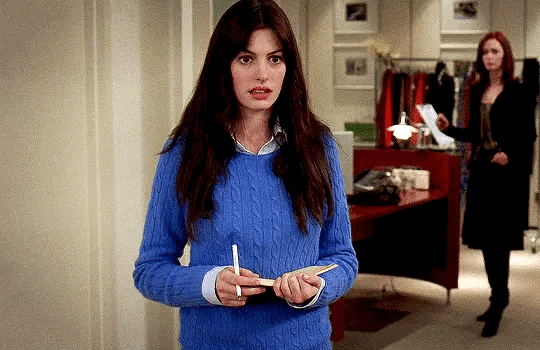
Drea: Please do! Also, another series I got into a couple summers ago, embarrassingly enough, was the HP series. I listened through the audiobooks which I borrowed from a friend. And while we don’t acknowledge the author because we don’t mess with bigots, I missed the hype during my childhood—I didn’t really know anyone who was into it, and [I] was interested in what was happening in the series. Having read it now, narratively, I really enjoyed it. And I found it really interesting how she who will not be named, consciously or subconsciously, included a lot of societal issues applicable to today’s reality in her magic system. There’s this creator on TikTok, Julian, who teaches his own version of CRT called “Critical Magic Theory,” where he breaks down issues and dynamics within the series on a deeper level, asking questions like what would it mean for elves to have been completely free and have autonomy? And essentially questioning the realities of that world and whether or not things had to be the way that they were.
And then the last book that I think had a major impact on me would be Michel Foucault’s Discipline and Punish. That one is a more serious, theoretical work. But it describes the psychological and political consequences of surveillance on communities, oftentimes historically oppressed and marginalized communities, and how [surveillance] gets adopted to the degree that you begin surveilling yourself and doing the work of limiting your own thoughts and behaviors for the sake of not wanting to be punished. I find surveillance to be such an interesting topic and I’ve been able to apply a lot of that theory to my own work, looking at our society of surveillance on marginalized communities. It’s a book that challenges the way I look at everything. So I think those are my favorites at the moment. All very different. *laughs*
Gabi: *laughs* A very well-balanced literary diet.
Gabi: Continuing along the topic of your favorite books, let’s talk about what’s on your shelves… First off, I love how they’re organized.
Drea: Thank you!
Gabi: I’m also honored to be a part of the shelves. I zoomed in to look at what titles you have and was like is that me? *laughs*
Drea: Yes! *laughs*
Gabi: But I’d love to hear more about your system(s) of organization. Like you have your John Grisham novels next to Hood Feminism—a rec I got from you by the way; so I’d love to know how you decide what’s stored with what. Do you make an effort to create balance with authors or themes, or is it just vibes?
Drea: Yeah. You know, I wish I did have a method to the madness of my bookshelves. *laughs* I feel like I went into it, wanting it to make a bit of sense. But then the more that I tried to organize it, it ended up being like ‘this is just what seems to fit here.’ I feel like sometimes I try to put books of the same caliber or genre near each other, but not in distinct piles. It might be a thing where maybe as like my collection grows, I will want to organize it more, but I also kind of love the aesthetic of like organized clutter. Where it might not look like it has a rhyme or reason but to me and my brain, there’s a system. *laughs*
Gabi: *laughs* Bookshelves are so personal, I feel like as long as it makes sense to you, that’s all that matters. And honestly I think having Baldwin’s Go Tell it on the Mountain next to Getting Involved with God is kind of genius, even if it wasn’t on purpose. *laughs*
Gabi: Ok, let’s rapid fire through some of your favorites. Fiction or nonfiction?
Drea: I would say generally, nonfiction, but it might be shifting more towards fiction.
Gabi: Hardcover or paperback?
Drea: Hardcover for the sake of not having covers rip accidentally when they’re in my bag.
Gabi: Physical book, ebook, or audiobook?
Drea: Physical book. I love seeing it on my shelf.
Gabi: Same. Favorite genre?
Drea: I think at the moment, it’s gonna be historical fiction.
Gabi: Favorite trope?
Drea: Ooh. Enemies to lovers. And particularly, opposites attract, disdain upon first meeting. Anything that’s giving like season 2 Bridgerton, ‘I cannot stand you, but you are both the bane and meaning of my existence.’ I will always root for that. *laughs*
Gabi: Taste. *laughs* Favorite book to screen adaptation?
Drea: Season 1 of Handmaid’s Tale, nothing beyond season 1. No offense, but the book ends where the first season of the show ends and I think anything after that goes beyond where I saw the narrative going [but] season 1 is really well done.
Gabi: What is a genre and trope pairing you love?
Drea: Ooh… genre and trope… dystopian reality and the love that shouldn’t exist but does. Like there’s no time to fall in love but yet it manifests anyway. I eat that up every time.
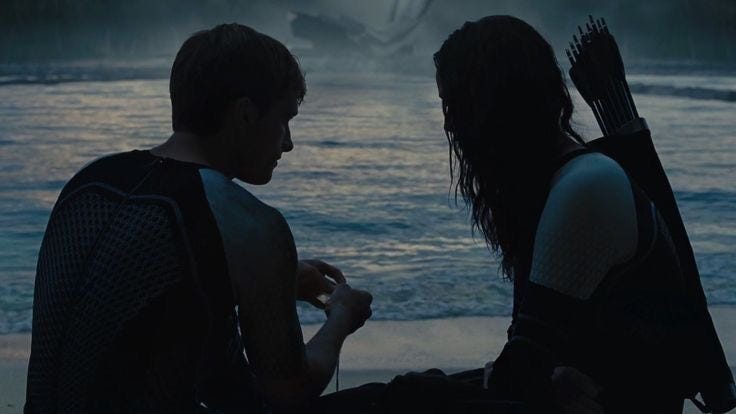
Gabi: Very Katniss and Peeta coded. What’s a book that you wish you could experience again for the first time?
Drea: Maybe Crying in H Mart.
Gabi: What is your favorite book quote, title, or dedication?
Drea: Oh my gosh, ok. That is a good question… I actually…can I whip it out? It’s in my suitcase.
Gabi: *laughs* Yeah, of course!
Drea: Okay, this is my favorite as of late, [from] The Trinity of Fundamentals. He says in the preface,
“evolutionary professionalism takes place when one dedicates themselves with all their personality and all their might to their convictions and principles. When they take a lofty position and become passionate about acquiring real skills and gifts, they are elevated to the category of vanguardism; where they surpass others in competence and become worthy of being labeled trusted guardians.”
I’ve been so enamored with the way that Rafeedie describes being a revolutionary as, like, a full time occupation and commitment towards your community. And being able to look at your position, as a revolutionary, as one that takes constant work, that you’re doing for the sake of your collective future, and I’ve just been loving it.
Gabi: That is a great quote, thank you for the sharing that.
Drea: Of course.
Gabi: What’s one book that you would recommend to anyone or that you wish everyone would read?
Drea: I think Discipline and Punish. Although its a very non-leisurely type of read, I think it really opens your eyes to the ways that we like limit our own behavior and each other’s behaviors for the sake of external anxieties, and I think it really alters your brain chemistry, so I think it’s a must read for everyone.
Gabi: Favorite book you read last year?
Drea: Um, let me see… I’m looking at the pictures I sent you… it was The Book of Form and Emptiness by Ruth Ozeki. It was an interesting read about the way that Western culture portrays or villainizes neurodivergence and views it as an inherent problem or something you have to treat or cure; whereas in non-Western cultures, oftentimes, neurodivergence is approached more gently and not viewed as a negative thing, but a shift in worldview and response.
Gabi: If you could grab dinner with any author, dead or alive, who would you dine with and why?
Drea: Oh wow. Maybe Khalil Gibran. Just because he’s so important, not only to my family, but I think to a lot of Arab people as an author. The impact he’s had on media, on Arab culture and literature, and being globally well known, I would love to pick his brain and get his thoughts on the state of the world today.
Gabi: Ok, favorite bookstore?
Drea: Favorite bookstore… One of the cutest ones in LA is Village Well in Culver City, because it’s also like a cafe. They just expanded it to have more seating and I’ve had multiple days where I’ve spent hours in there with like a panini, a coffee, and a dream. *laughs* And I’ll just take a break from whatever work I’m doing and roam through the aisles and pick my next read. And also supporting local independent bookstores is so important and a beautiful thing to do.
Gabi: I love that. We have a bookstore like that here in DC called Kramer’s. I’ll have to bring you when you come visit. Can you describe what your perfect reading day looks like?
Drea: Oh my gosh, yes. I think my perfect reading day would have to be in one of those really cozy, like windowsill nooks. And it’s gloomy and rainy and I have a blanket over me and multiple beverages to choose from. And there’s no one in the room besides myself and I can kind of like go back and forth between reading and other activities, like painting or listening to music, to take a break and digest what I’ve just read.
Gabi: Love that. If you could turn any book into a Blockbuster hit—you have your favorite studio behind you, you can handpick your actors, no budget; what book would you adapt?
Drea: Off the top of my head, I think In the Dream House as a blockbuster film would when every single Oscar. *laughs* And also be so groundbreaking in terms of representation in film and having discussions about queer relationships, and the ways abuse can manifest and its effects on those involved. So I think I would love to see that actually.
Gabi: Let’s talk what you’re currently reading: the last book you read, the book you’re reading now, and the book you plan to read next.
Drea: The last book I read was Brutes by Dizz Tate. Which is like a mystery-thriller. The book I’m reading right now is The Trinity of Fundamentals, and then the book that I want to read next is either, Hijab Butch Blues, which I have on my bookshelf and I need to read, or All About Love by bell hooks. I feel like that’s a book I keep getting recommended again and again and again. So probably either of those two.
Gabi: What’s one book that you feel is under hyped versus a book that you feel is overhyped?
Drea: A book that I feel is overhyped… I hate to say it. I think The Bell Jar by Sylia Plath. I’m so sorry. *laughs*
Gabi: *laughs*
Drea: The fig tree quote, I will say, is inspiring. I love it. Like we stare at the fig tree so long trying to decide what to do, who to become, and the fig tree ends up dying in the meantime. Like yes. But I also think [the book] is a little white women feminism. And by a little bit, I probably mean a lot. I see how it was revolutionary for its time but in today’s day and age, I would probably say its a bit overhyped, especially with the array of like feminist political thought that we have access to now.
But in terms of a book that’s under hyped, I’m gonna say The Catcher and The Rye. I know it’s a high school book and we we’re all told to read it and some people barely even remember it now, but I think there’s a lot of like internal dialogue and metaphors [from the book] that stuck with me and I think of all the time.
Gabi: What’s a genre you want to read more of? And a genre you can’t stand?
Drea: As we’ve discussed before, I would love to get more into romance in general, and maybe like fantasy romance just because I’ve heard so much about it and I want to explore and make my own opinions and have my own experience with the genre. And then I’m not a huge fan of anything thriller or horror based because I just get scared with everything and I need to sleep at night, so that will probably not be on my bookshelf. But I’ll leave it for other people to enjoy. *laughs*
Gabi: Same, I can’t do anything overly creepy or gory. *laughs* Ok, and to close us out, my favorite question to ask every guest I interview, what books or authors make up your literary astrological signs? Sun, moon, and rising.
Drea: Oh my gosh, that’s really good. I would say with my sun being in Cancer, I think I have to go with The Seven Husbands of Evelyn Hugo, because at its core, its an emotional and romanticized account of like a bittersweet love, and I’m so emotionally attached to those characters. For my rising, I would say maybe This Arab is Queer edited by Elias Jahshan, which feels very on the nose, but it’s straight to the point and direct. *laughs* And then my moon, probably In the Dream House, which just feels very Pisces, you know with dissecting the internal emotional battles that the author takes us through. They all encompass a large majority of my interests, things I’m thinking about and the conversations I love having.
Gabi: I love that. And I always forget that we’re sister signs and share so many placements.
Drea: Isn’t that so crazy?
Gabi: Like our friendship was meant to be. *laughs* I always say shoutout to Riley for pairing us together. She did her big one when she did that.
Drea: No, literally. *laughs* She knew this was gonna work out perfectly.
Gabi: And it did… Thank you so much for your time bestie and for sharing and being open to coming on the newsletter. I literally can’t wait to sit and transcribe all of this. *laughs*
Drea: Omg stop. I know it’s gonna be so full of our random tangents, which are obviously my favorite. *laughs* No, but thank you for having me! It’s such an honor to take part in something that you’re so passionate about. You constantly inspire me and you’re just one of the greatest pillars in my life and I’m so happy we got to do this! I hope I did you proud with the interview. *laughs*
Gabi: Stop! This was truly my favorite interview to date and it’s always a joy to get to unpack all the things with you and listen to how your brain works because you’re so amazing and talented and so smart. So thank you again.
Drea: Of course!
Gabi: Also, let me know when you start All About Love, because I want to finish reading it this year, so maybe we can read it together?
Drea: Yes, I’d love that.
Gabi: Perfect, talk soon. :)
Drea: Talk soon. :)
♡
For reading updates and to learn about LA-based opportunities for community involvement, you can find Drea here:
Dear readers, thank you so much for joining Drea and I for the first Shelf Diaries of 2025! I hope you enjoyed our conversation and left with a couple new books to check out and authors to keep your eye on! :) If you do end up finding a new favorite, come back and let me know in the comments so we can gush about it together!
If you have a creative, reader, or writer that you’d love to see featured, let me know in the comments or reply to this email with their social media handles, and I’ll be sure to add them to the list! As always, thank you so much for reading and I’ll see you soon!
Until next time, all my love…
xx gabi
LA Fire Relief + Mutual Aid Resources
Free Therapy for LA Fire Victims & Families
LA Fire Community Resources via WalkGoodLA
2/1/25 Youth Art Therapy Event by Dena Rebuild





